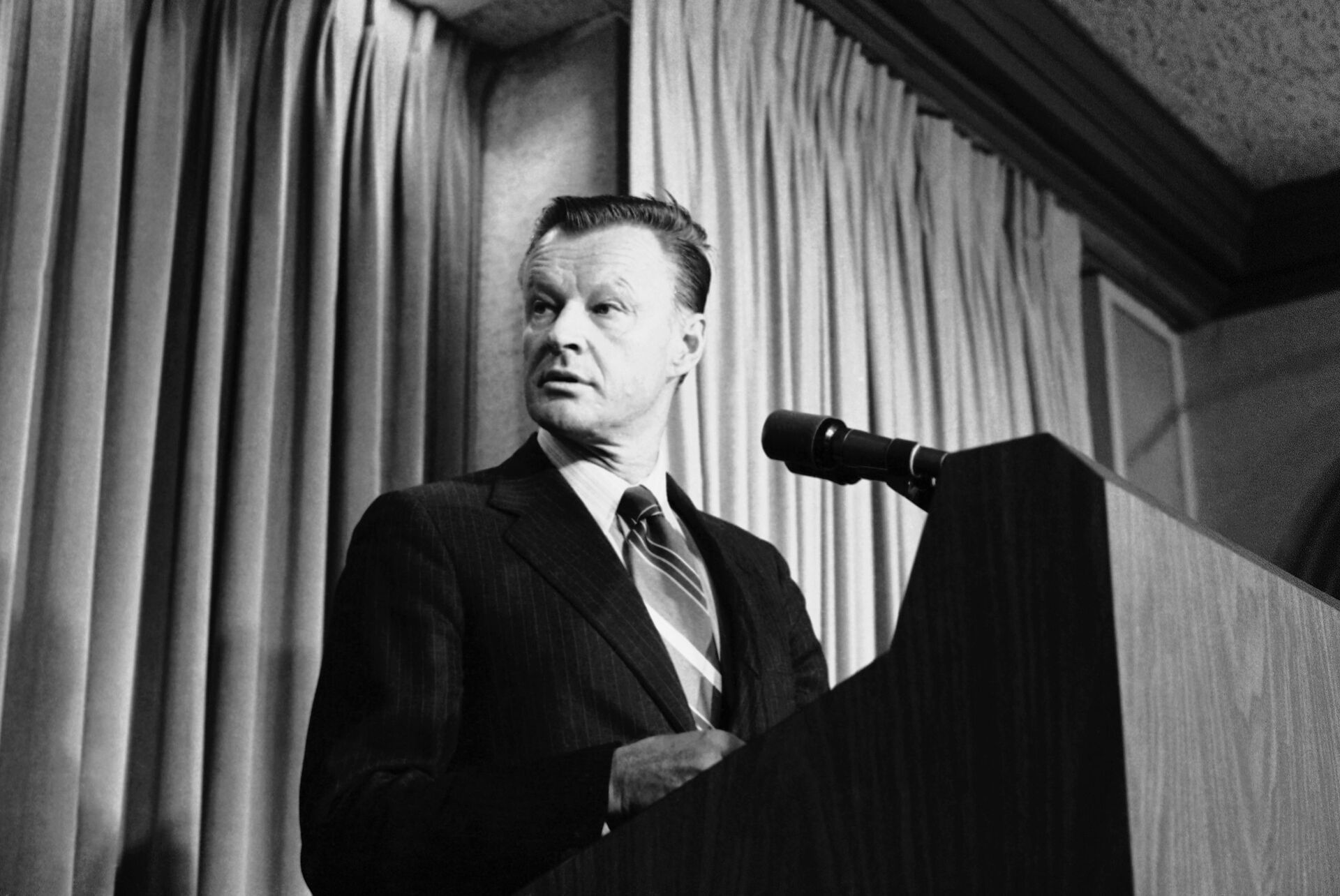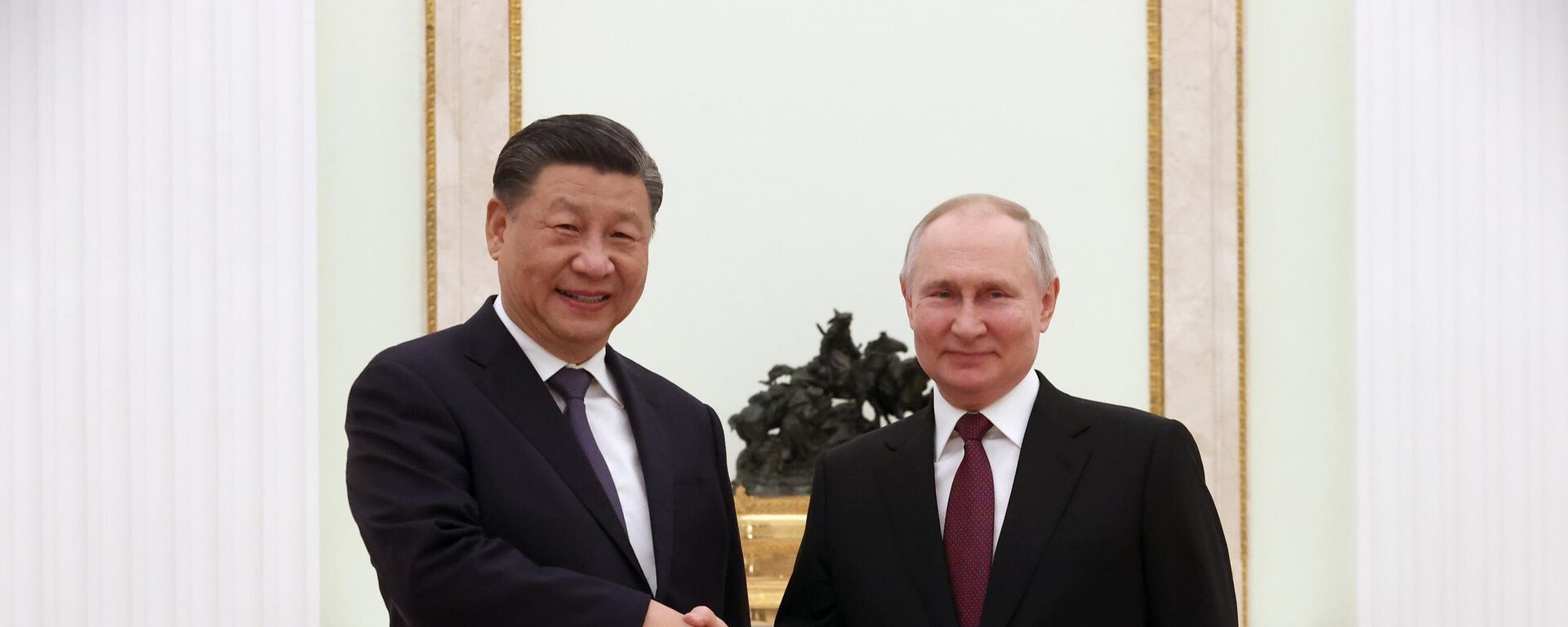https://sputnikglobe.com/20230320/brzezinskis-grand-chessboard-vision-of-russia-china-pact-becomes-reality-as-biden-antagonizes-both-1108616115.html
Brzezinski’s Grand Chessboard Vision of Russia-China Pact Becomes Reality as Biden Antagonizes Both
Brzezinski’s Grand Chessboard Vision of Russia-China Pact Becomes Reality as Biden Antagonizes Both
Sputnik International
Chinese President Xi Jinping arrived in Moscow on Monday for a formal state visit and talks with President Putin. The trip comes amid the continued expansion of Russian-Chinese economic, trade, technology, and security ties, and growing US antagonism toward both countries – a policy preeminent US geostrategists warned against many decades ago.
2023-03-20T18:36+0000
2023-03-20T18:36+0000
2023-03-20T19:01+0000
analysis
karen kwiatkowski
us
china
russia
geopolitics
international affairs
international relations
zbigniew brzezinski
henry kissinger
https://cdn1.img.sputnikglobe.com/img/102778/27/1027782763_0:107:2048:1259_1920x0_80_0_0_98daee9a1b3ddf5c354e1e8d93115700.jpg
Washington’s attempt to pursue a “dual-containment” strategy in Europe and Asia against both Russia and China simultaneously is neither financially or politically feasible, and threatens to critically overstretch and fundamentally undermine US global power, former Pentagon analyst Karen Kwiatkowski has told Sputnik.Commenting on the US effort to arm Ukraine and Taiwan at the same time, for example, the retired Air Force colonel said that weapons deliveries to Kiev have already demonstrated the limits to US material capabilities and strategic willingness, and said that attempts to replicate them vis-à-vis Taipei isn't possible.Reports on the dearth of weapons and ammunition to send to Ukraine began filtering through in the late summer and fall of last year, while a story from last month indicated that the Pentagon might be left without enough supplies to fight its own hot war if necessary amid shortages.Meanwhile, Taiwanese media has reported on regularly on the consequences of a $19+ billion backlog on US weapons already sold to Taipei, but left undelivered, with some of the contracts signed as far back as the Obama administration.If a hot war with direct US involvement were to break out, Washington would be caught in a major jam, Kwiatkowski believes.Brzezinski’s NightmareIn the late 1990s, the now late former Carter administration National Security Advisor Zbigniew Brzezinski – arguably of the two most preeminent US foreign policy minds of the second half of the 20th century alongside Henry Kissinger, wrote a book entitled "The Grand Chessboard," in which he outlined how “a grand coalition of China and Russia united not by ideology but by complementary grievances” threatened to pose a grave threat to US hegemony.Asked to comment on Brzezinski's assessment, and whether Xi Jinping’s Moscow visit was a sign of the "nightmare scenario" he outlined becoming a reality, Kwiatkowski said the answer may be yes, but with a caveat.At the same time, Kwiatkowski doesn’t believe shared grievances are the main factor behind the expansion of Russia-China ties. Rather, the two countries are “leaning together” due to the perception of “mutual future economic and security benefits.”Today’s Russia-China ties “signify a maturing of the relationship, and a long-term objective of both countries to being a good neighbor, and resolving their differences in diplomatic ways, rather than resorting to economic or military means,” Kwiatkowski said. “Before the United States became known for interfering with the elections of erstwhile allies, sanctioning them and destroying their energy infrastructure, our commitment to joint military training with other NATO members meant much the same thing,” the retired officer lamented.In light of the increasingly obvious political, financial and military weaknesses being displayed by the US today, Kwiatkowski predicts that both China and Russia’s leadership may eventually come to see Washington the way Washington looks at North Korea – a nuclear-armed power with a hostile government that is more of an annoyance than a threat. “Perhaps we are becoming a new North Korea, to be contained and humored but not really feared,” the observer summed up.
https://sputnikglobe.com/20230315/31trillion-national-debt-greatest-threat-to-us-not-russia-or-china-senator-1108433410.html
https://sputnikglobe.com/20230320/putin-xi-meeting-could-herald-end-of-dollar-hegemony-and-us-domination-1108590067.html
china
russia
Sputnik International
feedback@sputniknews.com
+74956456601
MIA „Rossiya Segodnya“
2023
News
en_EN
Sputnik International
feedback@sputniknews.com
+74956456601
MIA „Rossiya Segodnya“
Sputnik International
feedback@sputniknews.com
+74956456601
MIA „Rossiya Segodnya“
zbigniew brzezinski, henry kissinger, russia, china, united states, joe biden
zbigniew brzezinski, henry kissinger, russia, china, united states, joe biden
Brzezinski’s Grand Chessboard Vision of Russia-China Pact Becomes Reality as Biden Antagonizes Both
18:36 GMT 20.03.2023 (Updated: 19:01 GMT 20.03.2023) Chinese President Xi Jinping arrived in Moscow on Monday for a formal state visit and talks with President Putin. The trip comes amid the continued expansion of Russian-Chinese economic, trade, technology, and security ties, and growing US antagonism toward both countries – a policy preeminent US geostrategists warned against many decades ago.
Washington’s attempt to pursue a “dual-containment” strategy in Europe and Asia against both Russia and China simultaneously is neither financially or politically feasible, and threatens to critically overstretch and fundamentally undermine US global power, former Pentagon analyst Karen Kwiatkowski has told Sputnik.
Commenting on the US effort to arm Ukraine and Taiwan at the same time, for example, the retired Air Force colonel said that weapons deliveries to Kiev have already demonstrated the limits to US material capabilities and strategic willingness, and said that attempts to replicate them vis-à-vis Taipei isn't possible.
“Arming the two countries is not an identical process, as both are unique, and in a very different political, economic and geographic situation. The higher end arms promised Ukraine are actually both small in quantity, degraded in ability (for fear of Russian capture), and delayed in expected delivery time months and years. If an arms surge to Taiwan occurred following the Ukraine pattern, it would simply not be responsive or decisive, and would be somewhat pointless, on a practical level,” Kwiatkowski said.
Reports on the
dearth of weapons and
ammunition to send to Ukraine began filtering through in the late summer and fall of last year, while a story from last month
indicated that the Pentagon might be left without enough supplies to fight its own hot war if necessary amid shortages.
Meanwhile, Taiwanese media has
reported on regularly on the consequences of a $19+ billion backlog on US weapons already sold to Taipei, but left undelivered, with some of the contracts signed as far back as the Obama administration.
If a hot war with direct US involvement were to break out, Washington would be caught in a major jam, Kwiatkowski believes.
“The US is not able, nor has it organized itself, to fight a two-front war, nor to fight and survive a nuclear war. As relationships in various countries and former enemies can focus on future friendship, as we see with the China-led initiatives between Iran and Saudi Arabia, one more basis of US power projection is weakened, and possibly eliminated. The US ‘defense’ is really a global offense, and as those logistics and permissions change, the military strategy has to change - and large bureaucracies like the Pentagon and the military-industrial complex do not react effectively to such changes. Plus the political leadership in Washington is currently aged and weak, not trusted, and facing an election season which will consume most of its remaining energy,” the retired officer predicted.
In the late 1990s, the now late former Carter administration National Security Advisor Zbigniew Brzezinski – arguably of the two most preeminent US foreign policy minds of the second half of the 20th century alongside Henry Kissinger, wrote a book entitled "
The Grand Chessboard," in which he outlined how “a grand coalition of China and Russia united not by ideology but by complementary grievances” threatened to pose a grave threat to US hegemony.
Asked to comment on Brzezinski's assessment, and whether Xi Jinping’s Moscow visit was a sign of the "nightmare scenario" he outlined becoming a reality, Kwiatkowski said the answer may be yes, but with a caveat.
"Brzezinski was dealing with a world divided between communist/non-communist, and in 1997 looking at a world no longer strictly divided as developing and developed, non-communist and communist. His relevancy as a US strategist was ending, yet his intellectual lens, like more modern neoconservatives in Washington today, had not changed. That lens was (as it is today in Western government thought chambers) particularly anti-Russian, and generally anti-China. Given this perspective, he was right. Shared grievances between Russia and China could be dangerous to US dominance as a global player, and the global dominance of the US dollar, untethered by any value except confidence in the US government," she explained.
“For Brzezinski, the methods and patterns of US global behavior were positive and productive, in the US and around the world. The actual truth of the harmful economic and military impact of US policy and practice has finally caught up to the well-repeated story of the post-WWII period and US dominance. It's not just a Russia-China alliance that is dangerous to the old system, it is the rock-solid awareness by the whole world that US aggression and global offense is not worth the cost to them and their dreams, and needs to be put back in a box,” the observer stressed.
At the same time, Kwiatkowski doesn’t believe shared grievances are the main factor behind the expansion of Russia-China ties. Rather, the two countries are “leaning together” due to the perception of “mutual future economic and security benefits.”
Today’s Russia-China ties “signify a maturing of the relationship, and a long-term objective of both countries to being a good neighbor, and resolving their differences in diplomatic ways, rather than resorting to economic or military means,” Kwiatkowski said. “Before the United States became known for interfering with the elections of erstwhile allies, sanctioning them and
destroying their energy infrastructure, our commitment to joint military training with other NATO members meant much the same thing,” the retired officer lamented.
In light of the increasingly obvious political, financial and military weaknesses being displayed by the US today, Kwiatkowski predicts that both China and Russia’s leadership may eventually come to see Washington the way Washington looks at North Korea – a nuclear-armed power with a hostile government that is more of an annoyance than a threat. “Perhaps we are becoming a new North Korea, to be contained and humored but not really feared,” the observer summed up.





